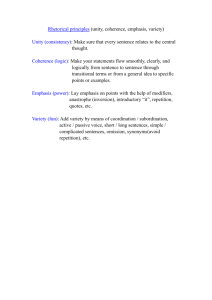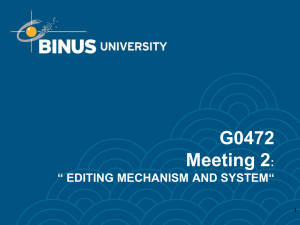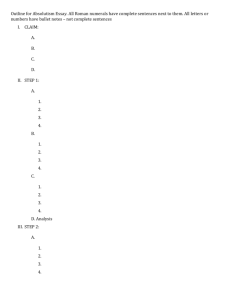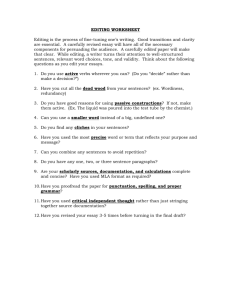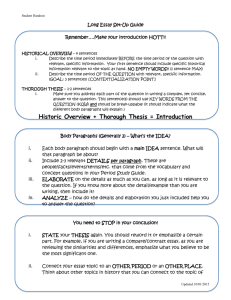REVISING
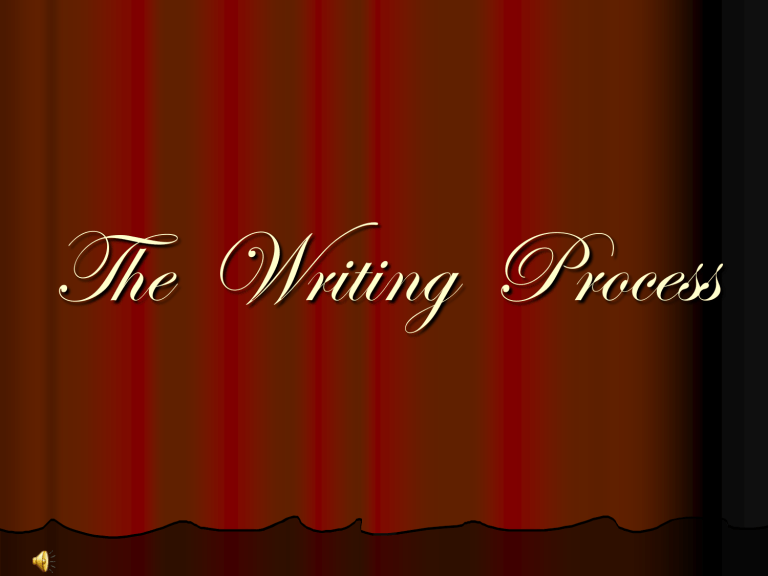
The Writing Process
Stage 4:
The Writing Process
~ Stage 1: Exploring,
Gathering Information--
Using Prewriting Strategies:
-Brainstorming
-Clustering
-Freewriting
The Writing Process
~ Stage 2: Planning the Essay
- Writing the Controlling Idea
- Organizing and Developing Support:
> Listing
> Outlining
~ Stage 3:
The Writing Process
Writing the first draft
~ Stage 4:
The Writing Process
The Writing Process
What you do beyond the first draft is:
~ Revision
~ Editing
The Writing Process
REVISION includes checking for organization, content, and language effectiveness.
EDITING includes checking for spelling, punctuation, capitalization.
The Writing Process-Revising
E
S
S
C
L
U
The Writing Process-Revising
C OHERENCE
L ANGUAGE
U NITY
E MPHASIS
S UPPORT
S ENTENCES
The Writing Process-Revising
REVISING
1.
COHERENCE:
- Orderly relationships of ideas.
- Each idea leads smoothly and logically to the next.
The Writing Process-Revising
Coherence
-Is there a clear pattern of organization
(time, space or emphasis?)
-Do you use “Transitions”?
Time: now, then, later, finally
Space: above, below, up, down
Emphasis: first, second, last
The Writing Process-Revising
- Is coherence enhanced by the use of transitional terms, pronouns, repetition, and consistent point of view?
The Writing Process-Revising
2. LANGUAGE
- Use appropriate language:
Academic language
- Tone-attitude toward the material and audience.
- Word Choice – Are the words precise in conveying meaning?
The Writing Process-Revising
3. UNITY
- A controlling idea establishes unity in every piece of good writing.
- It is the central point around which the supporting material revolves.
The Writing Process-Revising
Unity
For an essay, the elements are
~ the thesis
~ the supporting developmental paragraphs
All the supporting material should be related to the thesis.
Unity
The Writing Process-Revising
A good check on unity is to ask yourself if everything in your essay is subordinate to and derived from the controlling idea.
Do not confuse UNITY with COHERENCE:
COHERENCE: clear movement of thought from sentence to sentence or paragraph to paragraph.
UNITY: Staying on topic
The Writing Process-Revising
4. EMPHASIS
- Are ideas properly placed
(especially near the beginning and end) for emphasis?
The Writing Process-Revising
5. SUPPORT
Is there adequate material: examples, details, quotations and explanations to support each topic sentence and thesis?
- Are the points of support in the best possible order?
The Writing Process-Revising
6. SENTENCES:
- Are the sentences varied in length and beginnings?
- Are the sentences varied in pattern
(simple, compound, complex, comp/compl)?
- Are all problems with sentence structure
(FRAGMENTS, COMMA SPLICES, RUN ONS) corrected?
The Writing Process-Revising
EDITING: spelling, punctuation, capitalization
The Writing Process-Revising
Revise your first draft:
1. Read the essay from the beginning to the end for an overall assessment.
~Is it coherent?
~Is it unified?
~Is it well supported?
2. Read the essay a second time for “content.”
Read each paragraph and answer the “Content” questions in the peer review form.
3. Read the essay a third time for “form.” Read each sentence aloud to hear and correct any grammatical errors or awkward-sounding sentences.
Use the “Form” section of the Peer Review Form.
The Writing Process-Revising
4. Editing:
In practice, revising and editing are not always separate activities.
It is recommended that you wait until the next-to-the-last draft to edit some minor details and other small points that can be easily overlooked.
The Writing Process-Revising
Write your second draft.
Include the revisions.
Do not proofread on the computer screen.
Print your second draft.
Edit second draft.
